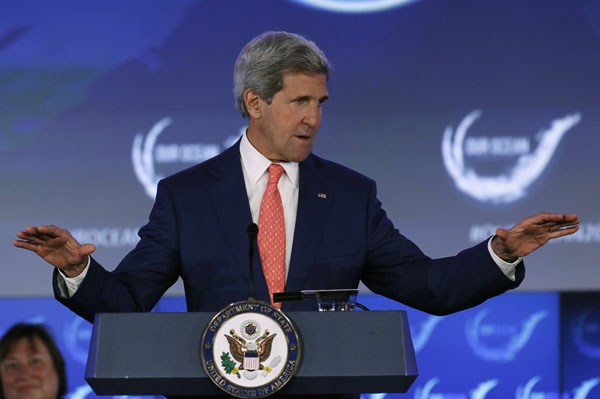|
||||||||
 |
|
U.S. Secretary of State John Kerry delivers opening remarks at the "Our Ocean" conference at the State Department in Washington on Monday. [Photo/Agencies] |
China's 18,000-kilometer coastline is among the 10 longest in the world and only slightly shorter than the 19,900 kilometer coast of the US. But while Americans flock to the various beaches along both the Pacific and Atlantic Oceans this summer, the Chinese will only find limited choices due to the heavy pollution along their nation's shore.
The 2013 China Ocean Environment Report released by the State Oceanic Administration two months ago pointed out a huge pressure from the pollution source coming from inland to the ocean and the subsequent severe pollution offshore. Literally 15 percent of offshore waters do not even meet the category 4 of the national sea water quality standard, the lowest in the criteria. Meanwhile, some 18,000 square kilometers of ocean suffer from serious nutrient pollution.
The report cited 72 rivers being monitored for pouring huge amount of pollutants into the ocean. measured as 13.82 million tons of chemical and oxygen demand, 293,000 ammonia nitrogen, 2.21 million tons of nitrate nitrogen, 272,000 tons of phosphate, 39,000 tons of petroleum, and 27,000 tons of heavy metals. The metals' total includes 20,743 tons of zinc, 3,073 tons of copper, 2,004 tons of lead, 138 tons of cadmium, 40 tons of mercury as well as 2,976 tons of arsenic.
 For too long, the ocean has become a dumping ground. The 431 stations monitoring pollution discharge from the land found that only half of the pollution discharge from these sources satisfied the national standards.
For too long, the ocean has become a dumping ground. The 431 stations monitoring pollution discharge from the land found that only half of the pollution discharge from these sources satisfied the national standards.
Statistics from monitoring stations also show that only 23 percent of the ocean ecological systems are healthy, while 67 percent are in the status of imperfect health and 10 percent are simply unhealthy.
Ocean ecology and environmental disasters continue to be major issues, said the report.
While the pressure on the fragile ocean ecology is higher than ever, some Chinese coastal provinces continue to map out their blueprints that put more emphasis on exploiting the ocean for short-term economic benefits rather than preserving and protecting the oceans. For example, South China's Guangdong province, which is already suffering severe pollution in its offshore waters, has a blueprint trying to make its marine economy as an important pillar.
The influx of tourists to the beaches has also been a concern. The sandy beach in Sanya, Hainan Island, is regarded among the best in the nation, yet on the Dadong Sea beach after the Mid-Autumn Festival in 2012; sanitation workers collected 50 tons of trash from all over the beaches.
Besides pollution, overfishing has become such a huge problem that television stations often feature fish farmers returning from their voyage with a little catch. This is occurring despite a finishing ban that has been imposed every year in many coastal areas such as the East China Sea fishing ban from June 1.
Clearly, China is not the only country facing such challenges.
On Monday and TuesdayJune 16-17, the US State Department in Washington has been holding "Our Ocean" Conference to rally nations around the world to fight overfishing, pollution and acidification of the oceans. The two-day summit has drawn some 400 people from 80 countries, including Prince Albert II of Monaco, Kiribati President Anote Tong and World Bank President Jim Yong Kim.
In his opening remarks on Monday, Secretary of State John Kerry made it a very personal cause, recalling his great love and respect for the ocean since childhood and later while serving in the US Navy, passing through different parts of the Pacific Ocean.
"It's sort of in my DNA. My mother's family was involved way back in the early days of trade through the oceans. And indeed my father was a passionate sailor who in his retirement, found a way to sail across the ocean several times."
Kerry said most people underestimate the enormous damage that human beings are inflicting on the ocean every day. "When people order seafood from a restaurant, most of the time they don't realize that a third of the world's fish stocks are overexploited, too much money chasing too few fish, and nearly all the rest are being fished at or near their absolute maximum sustainable level on a level on planet that has 6 six billion people that will rise to 9 billion over the next 30-50 years.
"The bottom line," he continued, " is that most people don't realize that if the entire world doesn't come together to try to change course and protect the ocean from unsustainable fishing practices, unprecedented pollution, or the devastating effects of climate change, then we run the risk of fundamentally breaking entire ecosystems." .
China has made a comprehensive 12th Five-Year Plan (2011-15) that includes everything from marine economy and resources to security and ecology. It pledges strong efforts to protect and restore the ocean.
Liu Cigui, minister of China's State Oceanic Administration, will talk about China's strategy in promoting ocean health through sound policies, scientific research, conservation strategies and innovative investment in a session on ocean health and science on Tuesday.
However, for China, the question often remains is a strong law that would be fully enforced.
Contact the writer at chenweihua@chinadailyusa.com

 Music at her fingers
Music at her fingers
 Across America Over the Week (Jan 16 - Jan 22)
Across America Over the Week (Jan 16 - Jan 22)
 Spend Chinese New Year in style
Spend Chinese New Year in style
 Ili river valley becomes a popular destination for swans
Ili river valley becomes a popular destination for swans
 Philip Ma: from scientist to businessman
Philip Ma: from scientist to businessman
 Birmingham's Spotlight on China dinner
Birmingham's Spotlight on China dinner
 How to distinguish doucai, wucai, Famille-rose and enamel porcelain
How to distinguish doucai, wucai, Famille-rose and enamel porcelain
 Xinjiang lake in bumper fishing season
Xinjiang lake in bumper fishing season
Most Viewed
Editor's Picks

|

|

|

|

|

|
Today's Top News
Houston's SW Chinatown
China to focus on reforms, opening of capital market
Slowdown brings new risks to banks
Trade group calls for BIT
Market status for China is 'political' issue
Birmingham's Spotlight on China dinner
Bank takes renminbi-clearing seriously
Traditional Garb
US Weekly

|

|








